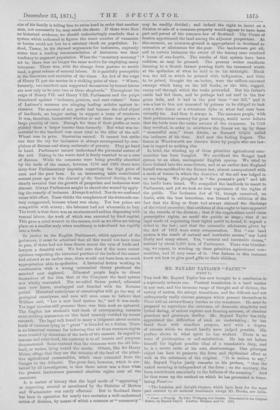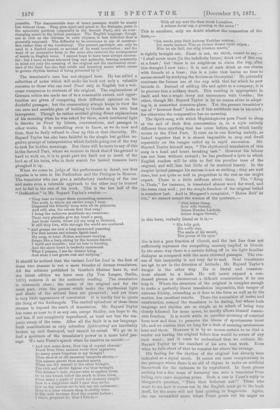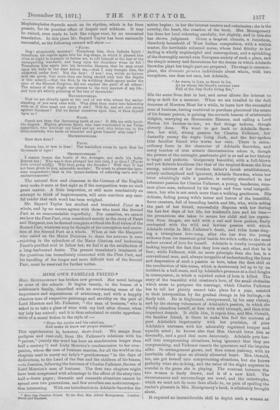MR. BAYARD TAYLOR'S "FAUST."* (PART I.)
THE task Mr. Bayard Taylor has now brought to a conclusion is a supremely arduous one. Poetical translation is a hard matter in any case, and the immense range of thought and of diction, the variety of metres, the abrupt transitions, and the difficult and not unfrequently really obscure passages which present themselves in Faust add an extraordinary burden to the translator. lie must be prepared to reproduce the extremes of domestic simplicity and lyrical daring, of ardent rapture and freezing sarcasm, of classical grandeur and grotesque devilry. Mr. Bayard Taylor has fully appreciated the difficulties of such an undertaking ; he has faced them with steadfast purpose, and with a degree of success which we should hardly have judged possible. His preface shows in what spirit he has worked. There is no trace of presumption or self-satisfaction. He has set before himself the highest possible ideal of a translator's duty, and he is a severe critic of his own shortcomings. One principal object has been to preserve the form and rhythmical effect as well as the substance of the original. " It is useless to say," Mr. Bayard Taylor justly remarks in his preface, " that the naked meaning is independent of the form ; on the contrary, the form contributes essentially to the fullness of the meaning." And he thus sums up the method on which be has proceeded in trans- lating Faust:—
"The feminine and dactylic rhymes, which have been for the moat part omitted by all metrical translators except Mr. Brooks, are indis-
* Faust: a Tragedy. By John Wolfgang von Goethe. Translated in the Original Metres, by Bayard Taylor. London: straws and Oo. 1871. pensable. The characteristic tone of many passages would be nearly lost without them. They give spirit and grace to the dialogue, point to the aphoristic portions (especially in the Second Part), and an over- changing music to the lyrical passages. The English language, though not so rich as the German in such rhymes, is loss deficient than is generally supposed. The difficulty to be overcome is one of construc- tion rather than of the vocabulary. The present participle can only be used to a limited extent, on account of its weak termination ; and the want of an accusative form to the noun also restricts tho arrangement of words in English verse. I cannot hope to have been always success- ful ; but I have at least laboured long and patiently, bearing constantly in mind not only the meaning of the original and the mechanical struc- ture of the lines, but also that subtle and haunting music which seems to govern rhythm instead of being governed by it."
The translator's care has not stopped here. He has added a collection of notes which will make his book not only a valuable resource to those who can read Faust only in English but a wel- come companion to students of the original. The explanations of German critics are made use of to a reasonable extent, and oppor- tunities are given of comparing their different opinions on the doubtful passages ; but the commentary always keeps in view the one sure and sensible plan of looking to Goethe as his own best
interpreter. Though he rather avoided giving direct explanations of his meaning when be was asked for them, much incidental light
is thrown on Faust by letters, conversations, and passages in other works. It is something even to know, as we do now and then, that he flatly refused to clear up this or that obscurity. Mr. Bayard Taylor has also been faithful to the simple but golden ne- gative precept of interpretation which forbids going out of the way to look for hidden meanings. But there will be more to say of this
in the Second Part, where we venture to think that if the ground is hard to walk on, it is in great part the fault not so much of the lord as of his heirs, who in their search for buried treasure have ploughed it up.
When we come to judge of the performance in detail, our first impulse is to turn to the Dedication and the Prologue in Heaven. The translator who can give a satisfactory rendering of the one and make even a tolerable approach to the other may be trusted not to fail in the rest of his work. This is the last half of the "Dedication" in Mr. Bayard Taylor's version :—
" They hear no longer those succeeding measures, The souls, to whom my earlier songs I sang
Dispersed the friendly troop with all its pleasures, And still, alas, the echoes first that rang!
I bring the unknown multitude my treasures ; Their vary plaudits give my heart a pang, And those beside, whose joy my song so flattered, If still they live, wide through the world are scattered.
"And grasps me now a long-unwonted yearning
For that serene and solemn Spirit-land:
My song, to faint Aaiun murmurs turning, Sways like a harp-string by the breezes fanned.
I thrill and tremble ; tear on tear is burning, And the•stern heart is tenderly unmanned.
What I possess, I see far distant lying,
And what I lost grows real and undying."
It should be noticed that the variant Leid for Lied in the first of these two stanzas is not a mere blunder of former translators. All the editions published in Goethe's lifetime have it, and the latest edition we have seen (by Von Loepor, Berlin, 1870) restores it as the authentic reading. The translation is extremely close ; the metre of the original and for the most part, even the pauses which make the rhythmical light and shade of the several lines are preserved ; and yet there is very little appearance of constraint. It is hardly fair to quote the Song of the Archangels. The exalted splendour of these three stanzas is beyond the reach of translation. Mr. Bayard Taylor has come as near to it as any one, except Shelley, can hope to do, and has, if not completely reproduced, at least not lost the ma- jestic sweep of the verse. After all the fault is in our language. Such combinations as ewig selinellent ,Splairenlauf are inevitably broken up and destroyed, and cannot be recast. We go on to find a specimen of the translator's power in a more level pas- sage. We take Faust's speech when he resolves on suicide :—
" And now come down, thou cup of crystal clearest ! Fresh from thine ancient cover thou appearest, So many years forgotten to my thought! Thou shon'st at old ancestral banquets cheery,— The solemn guests thou modest merry, When one thy wassail to the other brought. The rich and skilful figures o'er thee•wrought, The drinker's duty, rhyme-wise to explain them, Or in one breath below the mark to drain them, From many a night of youth my memory caught. Now to a neighbour shall I pass thee never, Nor on thy curious art to test my wit endeavour ; Here is a juice whence sleep is swiftly born. It fills with browner flood tby crystal hollow ; I chose, prepared it; thus I follow,— With all my soul the final drink I swallow,
A solemn festal cup, a greeting to the morn ! "
This is excellent, only we doubt whether the connection of the lines,—
"Ich werde jetzt Dioh keinom Nachbar reichen, Iob werde meinen Witz nu Deiner Kunst nicht zeigen ; Hier ist ein Saft, der eilig trunken macht,"
is rightly brought out. Faust is not, we think, meant to say,- ' I shall never more [in the indefinite future] drink out of this cup at a feast;' but there is no neighbour to claim the cup, after this draught I now take ; it is not of such drink as one shares
with friends at a feast ; this is a juice that leaves no time to amuse oneself by studying the devices on the crystal.' He pointedly
contrasts the former use of the cup with that for which he now intends it. Instead of adding life and spirit to a company, it is to procure him a solitary death. This reading is appropriate in itself, and has a tragic irony not uncommon with Goethe ; the other, though Mr. Bayard Taylor is by no means alone in adopt- ing it, is somewhat common-place. Yet the present translator's use of " browner flood" looks as if this antithesis was in his mind ; for otherwise the comparative has no meaning.
The Spirit-song with which Mephistopheles puts Faust to sleep at the end of their first conversation is, in a style entirely different from anything that has come before, and which hardly recurs in the First Part. It runs on in one flowing melody, so linked together that it is almost impossible to atop and dwell separately on the images called up in rapid succession. Mr. Bayard Taylor himself says, " The rhythmical translation of this song is a head and heart breaking task." However his labour has not been without reward ; he has produced a lyric in which English readers will be able to feel the peculiar tone of the original, and will lose but little of its metrical beauty. In the simpler lyrical passages his success is not so striking ; they are well done, but not quite so well in proportion to the rest as one might expect. There is a little stiffness about them. The "King in Thule," for instance, is translated almost word for word, and the verse runs well ; yet the simple freedom of the original ballad is somehow lost. And in Margaret's complaint, " Maine Huh' ist bin," we cannot accept the version of the quatrain,- " Sein hoher Gang, Saha' edle Gestalt,
Seines Mundes Liieheln, Seiner Augon Gewalt,"
in this form, verbally literal as it is,- " His lofty gait,
His noble size,
The smile of his mouth, The power of his oyes."
Size is but a poor fraction of Gestalt, and the last line does not sufficiently represent the compelling mastery implied in Gewalt. In the same way there is a certain falling off in the light familiar dialogue as compared with the more elevated passages. The rea- son of this inequality is not very far to seek. Most translators are apt to err in the direction of latitude ; Mr. Bayard Taylor's danger is the other way. He is literal and conscien- tious almost to a fault. He will never expand a con- densed phrase or circumvent a difficult construction if he can help it. Where the structure of the original is complex enough to make a perfectly literal translation impossible, this temper of extreme fidelity, extending as it does to the form as well as to the matter, has excellent results. There the necessities of metre and construction compel the translator to be daring, but where both language and rhythm are so simple as to admit of being very closely followed for some space, he hardly allows himself reason- able freedom. It is worth while to sacrifice accuracy of external form now and then to preserve the bloom of spontaneous inner life, and we confess that we long for a dash of seeming carelessness here and there. However it is by no means certain to us that a reader not having the original before him would be aware of any such want ; and it must be understood that we criticize Mr. Bayard Taylor by the standard of his own best work. Even when he falls short of that he remains far above the average.
His feeling for the rhythm of the original has already been indicated as a signal merit. It comes out most conspicuously in the passages where there is no aid of rhyme to make an artificial framework for the cadences to be reproduced. In these places nothing but a fine sense of harmony can save a translator from falling into mere shapeless prose. Such a one is Faust's reply to Margaret's question, "Then thou believest not?" Those who want to see how it comes out in the English must go to the book itself, for the scene will not bear quoting in fragments. Again, the one unversified scene where Faust pours out his anger on
MEPHISTOPHELES.
I cannot loosen the bonds of the Avenger, nor undo his bolts. Rescue her ! Who was it that plunged her into ruin, I or thou ? (FAusT looks around wildly). Wilt thou grasp the thunder ? Well that it has not been given to you, miserable mortals! To crush to pieces the inno- cent respondent—that is the tyrant-fashion of relieving one's self in embarrassments."
The natural flow and closeness to the German of the English may make it seem at first sight as if the composition were no such great matter. A little inspection, or still more conclusively an attempt to think of improvements, will soon convince any care- ful reader that each word has been weighed.
Mr. Bayard Taylor has studied and translated Faust as a whole, and by no means agrees with those who treat the Second Part as an unaccountable superfluity. For ourselves, wo cannot see how the First Part, even considered merely as the story of Faust and Margaret, can be deemed complete without the final vision of the Second Part, whatever may be thought of the conception and execu- tion of the Second Part as a whole. When at last the Margaret who called on the Mater Dolorosa to share her sorrows is seen . rejoicing in the splendour of the Mater Gloriosa and beckoning Faust's purified soul to follow her, we feel it as the satisfaction of a long-harboured desire. The present translator's treatment of the questions less immediately connected with the First Part, and his handling of the longer and more difficult text of the Second Part, must be reserved for further notice.
Mephistopheles depends much on its rhythm, which is far from prosaic, for its peculiar effect of despair and wildness. It may be ruined, even made to look like vulgar rant, by an unmusical translation. In this piece Mr. Bayard Taylor has been eminently successful, as the following extract will show :— "FAIIBT.
Dog 1 abominable monster! Transform him, thou Infinite Spirit 1 transform the reptile again into his dog-shape, in which it pleased him often at night to scamper on before me, to roll himself at the feet of the unsuspecting wanderer, and hang upon his shoulders when ho fell ! Transform him again into his favourite likeness, that he may crawl upon his belly in the dust before me,—that I may trample him, the outlawed, under foot! Not the first! 0 woe woe, which no human soul can grasp, that more than one being should sink into the depths of this misery,—that the first, in its writhing death-agony under the oyes of the Eternal Forgiver, did not expiate the guilt of all others 1 The misery of this single one pierces to the very marrow of my life ; and thou art calmly grinning at the fate of thousands !
MurmsTorHELEs.
Now we are already again at the end of our wits, where the under- standing of you men runs wild. Why didst thou enter into fellowship with us, if thou eanst not carry it out ? Wilt fly, and art not secure against dizziness ? Did we thrust ourselves upon thee, or thou thyself upon us ?
FAUST.
Gnash not thus thy devouring teeth at me ! It fills mo with horri- ble disgust. Mighty, glorious Spirit, who last vouchsafed to me Thine apparition, who knoweet my heart and my soul, why fetter mo to the felon-comrade, who foods on mischief and gluts himself with rule ?
MEPHIsTorsELEs.
East thou done? FAUST.
Rescue her, or woe to thee ! The fearfullest curse be upon thee for thousands of ages!












































 Previous page
Previous page